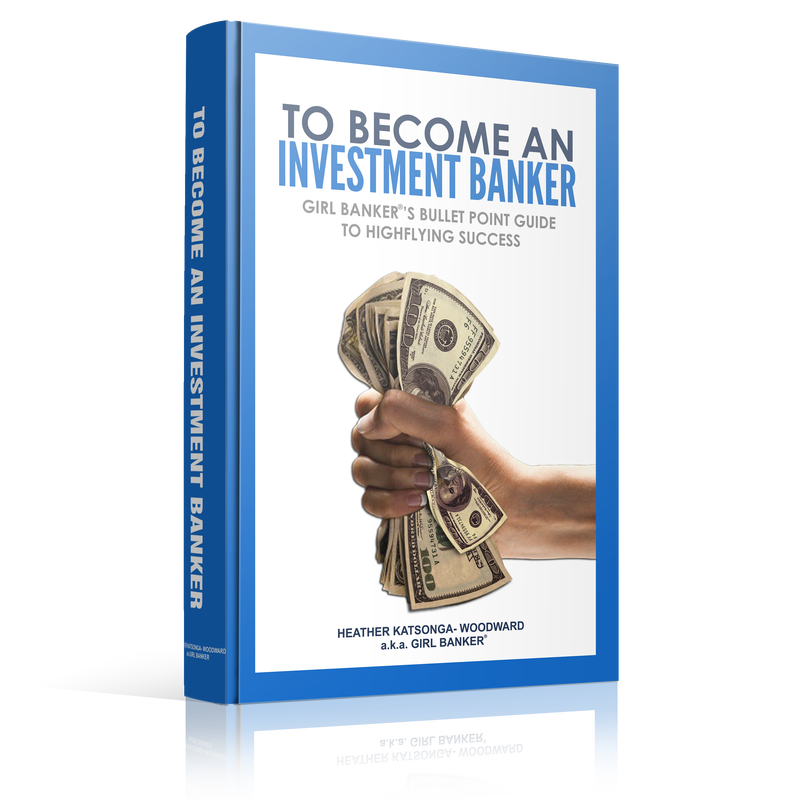 by Girl Banker Listen to the iTunes podcast instead. Connecting with people and building your list of contacts is absolutely key to getting and staying in the investment banking industry. Here are five more tips following part 1 on Networking Yourself into an Investment Bank. 6. Catch up with your peers, especially any economics students, on how they are going about hunting for a job.
7. Always send a follow up email to new contacts: A ‘thank you’ or ‘great to meet you’ email always goes down well. In addition, you can elaborate on a discussion you had or perhaps remind them to send you something that they said they would or vice versa. 8. Join LinkedIn. You can use this as a tool to connect with any new contacts you have made.
9. Find a mentor or a coach. A coach will give you constructive feedback on the quality of your answers to interview questions, your body language, the tone of your voice and importantly how you can improve. Every top performer in sport or industry has a mentor coaching them to success. You can receive one-on-one coaching from Girl Banker®. 10. Finally, ask intelligent questions! As part of SEO, I had exposure to many high-ranking bank officials at networking events and I made it a point to ask something smart, so much so that my peers began to recognize me as the girl who likes asking questions. At the end of the experience SEO awarded me recognition as ‘The Most Insistent Person.’ Don’t ask me what that means!
0 Comments
 by Girl Banker Above all else, building a cache of contacts helps your career in direct and indirect ways. Five pointers on networking: 1. Attend networking events and aim to leave with about two business cards. Don’t stretch yourself thin by trying to meet with everyone; it’s much more useful to have a proper conversation with two people than ten superficial conversations. The two people you connect with are more likely to remember you later on. 2. Look engaged when you're talking to people Maintain eye contact, don’t keep on looking away and don’t check your phone – not even once. 3. Go to local recruitment events. If you manage to find out the names of any speakers in advance, do some research on them so that you can ask very specific questions, based on the speaker’s own experience of the industry.
4. If you don’t have business cards, get some made, even if you are still in university. I did this and found them handy in creating an impression. Let’s face it, it’s very unlikely that the investment bankers that you give your card to will actually call you. However, you will look like a real keeno if you have cards when most of your peers do not. Vistaprint produces good quality affordable cards. 5. Join any professional organizations or societies related to investment banking. You will probably find some in your local careers magazines or on careers websites.
You might also be interested in: networking part 2. by Girl Banker® Listen to the iTunes podcast instead. What, you googled me? I was aghast when a fellow intern went home and googled everyone he wanted to know more about. Armed with that knowledge, he came to day 2 of a training session asking personal questions. When he started asking me stuff about my family I felt violated; that was 2004.  Today, you should expect to be googled by your employer. Information is power and the more an employer can find out about you the better equipped they are to determine whether or not you fit in with the investment bank’s culture. Your silly tweets could be the reason no one is inviting you for an interview. It may well have been funny when you were sharing it but it’s going to be a lot less humorous when all your friends are hooked up with a cushy job and you’re not. The headline test – before you post anything think: “Would I be proud to see this shared on the front cover of The Wall Street Journal or The Financial Times?
Anger backtrack – if you’re angry, annoyed or irritated do not tweet, blog or post anything. Feel free to rant and rave about it in your personal word processor but leave it be until you are not angry and you’ll find that it was going to be one of those posts you later regretted. De-connect – if you tweet a lot of random stuff, do not connect your twitter to your LinkedIn. You know employers and headhunters officially trawl LinkedIn profiles to find out stuff, right? Close up – so you’re mr or ms popular: you’re the entertainment organizer at your school or university. Good for you, but that doesn’t mean you need to have an open Facebook profile. If people are actually interested in what you have to say they will friend you or subscribe to your public tweets. Go through your personal info and carefully select what is viewable by the public. It should only be stuff that adds positive value to your employability. Choose your friends carefully – Facebook didn’t always have the subscription button so people used to accept friends willy nilly. Personally, I don’t friend anyone that I don’t actually know. Decide what criteria people need to satisfy to be your “friend” on Facebook and only friend those. Everyone else can subscribe to your public posts. The funny test – the biggest temptation is to share stuff that makes us laugh. Once you’ve had a good laugh you always want to share. Making people laugh makes them like us and everyone loves to be liked. Unfortunately, a lot of funny stuff is funny because it’s taking a stab at a certain segment of society. Before you share funny stuff, think about whether it makes you look like a misogynist, a racist, a homophobe, a pervert or whether it is persecuting a given religious group. I know a guy who had a nice job that he could have stayed in for years but ended up having to resign because he was sharing inappropriate material. Pseudonym – you don’t have to use your real name. Even if you use a real photo of yourself if you create a pseudonym you’re going to be hard to find with google searches. If you’re working under an alias you have a lot more leeway in terms of what you tweet and share, however, keep in mind that someone in the ‘inner circle’ could betray your confidence. Social networking is fun but we all get carried away sometimes and forget just how public cyberspace is. I am not that personal a person and I am happy to share a reasonable amount but I am extremely careful with what I post. Nonetheless I have experienced tweeter’s remorse and by the time I do, it’s already hit my LinkedIn and my Facebook because they are all connected. I not only have to delete the tweet but I have to rush and delete in all those other places also. If the post has already been shared by friends, it’s a losing battle. Be wise to your social network.  by Girl Banker To Become an Investment Banker is now available for sale on Amazon or off this website. All your questions on the application and interview process, possible interview questions and the dos and don'ts of banking have been fully answered in this book. Get your copy now. Please subscribe to receive info that will help you get into investment banking directly to your inbox AND you will get Chapter 1 of To Become an Investment Banker for FREE! |
Girl Banker®I created my investment banking blog in 2012 as soon as I resigned from i-banking & published my book, To Become An Investment Banker.
Initially published at girlbanker.com, all posts were later subsumed into my personal website under katsonga.com/GirlBanker. With 7 years of front office i-banking experience from Goldman Sachs and HSBC, in both classic IBD (corporate finance) and Derivatives (DCM / FICC), the aim of GirlBanker.com was to make it as straight-forward as possible to get into a top tier investment bank. I'm also a CFA survivor having passed all three levels on the first attempt within 18 months - the shortest time possible. Categories
All
Archives
August 2017
|
Heather Katsonga-Woodward, a massive personal finance fanatic.
** All views expressed are my own and not those of any employer, past or present. ** Please get professional advice before re-arranging your personal finances.




 RSS Feed
RSS Feed





